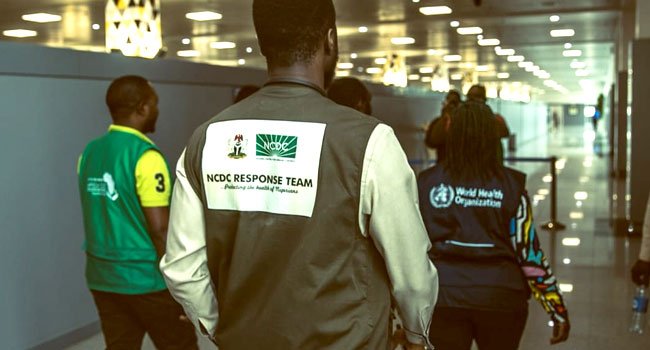THE Nigeria Centre for Disease Control and Prevention (NCDC) has calmed public fears after confirming that two recent suspected cases of viral hemorrhagic fever in Abuja tested negative for both Ebola Virus Disease (EVD) and Marburg Virus Disease.
The announcement was made in a public health advisory received by News Point Nigeria on Friday and signed by the agency’s Director General, Dr. Jide Idris, amid growing speculation over a possible Ebola outbreak in the Federal Capital Territory.
“The NCDC wishes to inform the public that two recent suspected cases of viral hemorrhagic fever in Abuja both tested negative for Ebola and Marburg viruses. We are currently testing samples for other viral hemorrhagic fevers like Lassa fever and dengue fever,” the statement read in part.
According to NCDC, one of the cases involved a traveller who had just returned to Nigeria from Kigali, Rwanda. The patient promptly presented himself to a hospital in Abuja after developing symptoms, a move the agency said was crucial in preventing a potential outbreak.
“His decision to report early, combined with the vigilance of the attending clinician and hospital team, ensured that our public health system was promptly activated and that the risk to the public was minimised.
“This responsible action is highly commendable and a good practice all Nigerians are urged to emulate,” the agency stated.
NCDC commended the clinicians and staff at Nisa Premier Hospital, whose quick response and immediate reporting triggered the activation of Abuja’s rapid response mechanism.
The agency also praised the FCT Epidemiology and Rapid Response Teams, Port Health Services, National Reference Laboratory, and immigration authorities for their seamless collaboration.
While reassuring Nigerians that there is no Ebola outbreak in the country, the NCDC said it has strengthened its nationwide anticipatory measures in view of recent Ebola cases reported in the Democratic Republic of Congo (DRC), where 48 confirmed and probable cases have claimed 31 lives.
Measures put in place include: heightened surveillance at airports, seaports, and land borders, placing isolation and treatment facilities on high alert.
Prepositioning infection-prevention supplies such as PPEs and disinfectants.
Conducting dynamic risk assessments and simulation exercises in all 36 states and the FCT.
“Our national reference laboratories remain on standby to provide rapid testing, and public health teams are ready to conduct contact tracing if needed,” the statement assured.
The NCDC called on state governments to strengthen surveillance systems and keep isolation centres ready, while private and public healthcare workers were urged to maintain a high index of suspicion for hemorrhagic fever cases.
Nigerians were advised to: practice good personal hygiene, including regular handwashing, avoid contact with sick or dead wild animals and meat from unknown sources and seek medical attention immediately if they develop symptoms such as fever, headache, sore throat, or muscle pain, especially after travel.
Ebola virus disease (formerly known as Ebola Hemorrhagic Fever) is a severe, often fatal illness with a case fatality rate ranging from 25 to 90 percent. It spreads through contact with the blood, body fluids, or secretions of infected persons or animals.
Symptoms typically include sudden fever, muscle pain, intense weakness, headache, and sore throat. Without early treatment, it can lead to internal and external bleeding, multi-organ failure, and death.
The NCDC reassured Nigerians that the country’s public health surveillance and response systems remain robust and capable of detecting and containing any potential Ebola or Marburg outbreak.
“Together, the vigilance of our citizens and the preparedness of our health system will ensure that we protect our communities and prevent public health emergencies,” Dr. Idris stated.







